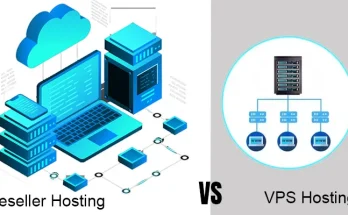In the realm of web hosting, Linux dedicated servers stand as pillars of performance, security, and flexibility. Offering unparalleled control and customization options, these servers empower businesses to scale efficiently, safeguard sensitive data, and adapt to evolving technological landscapes. In this comprehensive guide, we delve into the world of Linux dedicated servers, exploring how they unlock superior performance, fortify digital fortresses with robust security measures, and provide the flexibility needed to thrive in dynamic environments.
1: Understanding Linux Dedicated Servers
Defining Linux dedicated servers:
A Linux dedicated server is a type of hosting service where an entire physical server is dedicated solely to the needs of a single client or organization. Unlike shared hosting, where multiple websites share the resources of a single server, or virtual private servers (VPS), where a server is partitioned into multiple virtual environments, a Linux dedicated server provides exclusive access to all the resources, including CPU, RAM, storage, and bandwidth.
This exclusivity offers several advantages, such as enhanced performance, greater control over server configurations, improved security, and scalability. Linux, as the operating system of choice for many dedicated servers, provides a stable, secure, and highly customizable platform for hosting a wide range of applications and services.
The anatomy of a Linux dedicated server:
Understanding the components of a Linux dedicated server is crucial for optimizing its performance and ensuring seamless operations.
Hardware Specifications: A Linux dedicated server typically consists of high-performance hardware components, including processors (CPU), random access memory (RAM), storage drives (HDD or SSD), network interfaces, and redundant power supplies. These components are carefully selected to meet the demands of intensive workloads and ensure optimal performance.
Operating System: Linux, with its open-source nature and extensive community support, is the preferred operating system for many dedicated server environments. Popular Linux distributions used in dedicated hosting include CentOS, Ubuntu Server, Debian, and Fedora. Each distribution offers unique features, package management systems, and support options, allowing users to choose the one that best suits their requirements.
Control Panel Options: Control panels such as cPanel, Plesk, and Webmin provide graphical user interfaces (GUIs) for managing various aspects of the server, including website hosting, email services, database management, and security configurations. These control panels simplify server administration tasks and offer intuitive tools for monitoring and maintaining server health.
Advantages of Linux dedicated servers over alternative hosting solutions.
Linux dedicated servers offer numerous advantages that make them an ideal choice for businesses seeking robust hosting solutions. Some key advantages include:
- Performance: With exclusive access to server resources, Linux dedicated servers deliver unparalleled performance, ensuring fast load times, responsive websites, and seamless user experiences. This performance boost is particularly beneficial for high-traffic websites, resource-intensive applications, and e-commerce platforms.
- Customization: Linux provides extensive customization options, allowing users to tailor the server environment to their specific needs and preferences. From selecting the perfect combination of software packages to fine-tuning system configurations, Linux dedicated servers offer unparalleled flexibility and control over the hosting environment.
- Security: Linux is renowned for its robust security features, including built-in firewall capabilities, access control mechanisms, and regular security updates. By leveraging these features, Linux dedicated servers provide a secure hosting environment that protects against unauthorized access, malware, and other cyber threats.
- Stability: Linux operating systems are known for their stability and reliability, making them well-suited for mission-critical applications and long-term deployments. With proper maintenance and monitoring, Linux dedicated servers can provide uninterrupted service and minimize downtime, ensuring maximum availability for your websites and applications.
2: Unleashing Performance with Linux Dedicated Servers
Unleashing performance with Linux dedicated servers entails harnessing the raw power of bare-metal infrastructure to optimize speed, responsiveness, and efficiency. By leveraging exclusive access to server resources, including CPU, RAM, and storage, Linux dedicated servers offer unparalleled performance for demanding workloads. Resource allocation and management techniques ensure that computational resources are utilized efficiently, maximizing the server’s capabilities. Advanced technologies, such as solid-state drives (SSDs) and optimized networking protocols, further enhance performance, enabling lightning-fast data transfer speeds and reduced latency. Whether hosting high-traffic websites, running complex applications, or handling intensive data processing tasks, Linux dedicated servers provide the robust performance needed to meet and exceed performance expectations. With meticulous optimization and fine-tuning, businesses can unlock the full potential of their Linux dedicated servers, delivering exceptional user experiences and driving business growth in the digital age.
3: Fortifying Security Measures
Fortifying security measures on GPU dedicated servers involves implementing robust strategies to safeguard against cyber threats and unauthorized access. Leveraging the inherent security advantages of Linux, including its strong user permissions system and built-in firewall capabilities, is paramount. Proactive measures such as regular security patches, intrusion detection systems, and stringent access controls bolster defense mechanisms. Best practices such as encryption protocols, secure shell (SSH) configurations, and strong password policies further enhance server security. Compliance with industry standards and regulations ensures adherence to data protection guidelines and safeguards sensitive information. By prioritizing security and staying vigilant against evolving threats, businesses can maintain the integrity and confidentiality of their data on Linux dedicated servers.
4: Achieving Flexibility and Scalability
Achieving flexibility and scalability with Linux dedicated servers involves tailoring server configurations to meet evolving business needs while ensuring seamless expansion opportunities. Through customizable setups and scalable resources, businesses can adapt server environments to varying workloads and growth demands. Vertical scaling allows for the addition of resources such as CPU and RAM to existing servers, while horizontal scaling involves adding more servers to distribute workload efficiently. Automation tools and orchestration solutions streamline server management processes, enabling rapid deployment and scaling. Integration with cloud services further enhances flexibility, offering hybrid infrastructure options for dynamic workloads. By embracing these strategies, businesses can achieve the agility and scalability required to thrive in today’s ever-changing digital landscape.
5: Best Practices for Managing Linux Dedicated Servers
Best practices for managing Linux dedicated servers entail proactive monitoring, regular maintenance, and strategic optimization techniques. Implementing robust monitoring tools allows for real-time performance tracking, ensuring prompt detection and resolution of potential issues. Scheduled updates and patches help keep servers secure and operating at peak efficiency, while automated backup and disaster recovery systems minimize downtime and data loss risks. Adhering to strict security protocols, such as strong authentication methods and firewall configurations, enhances server resilience against cyber threats. Documentation of configurations and procedures facilitates efficient troubleshooting and knowledge sharing among team members. By following these best practices, businesses can effectively manage Linux dedicated servers, ensuring reliability, security, and optimal performance.
6: Choosing the Right Linux Dedicated Server Provider
Choosing the right Linux dedicated server provider is essential for ensuring reliable performance, excellent support, and scalability. Factors to consider include the provider’s reputation, uptime guarantees, and service level agreements (SLAs). Assessing server specifications, such as hardware quality and network infrastructure, is crucial for meeting performance requirements. Additionally, evaluating the provider’s support offerings, including technical assistance and response times, is vital for resolving issues promptly. Pricing models, including upfront costs and ongoing fees, should align with budgetary constraints and value propositions. Lastly, considering additional services like managed hosting, backup solutions, and security offerings can further enhance the overall hosting experience. By carefully weighing these factors, businesses can select a Linux dedicated server provider that meets their specific needs and supports their long-term growth objectives.
Conclusion:
Linux dedicated servers represent the pinnacle of hosting excellence, offering unmatched performance, security, and flexibility for businesses of all sizes. By harnessing the power of these robust servers, organizations can unlock new levels of efficiency, protect their digital assets, and adapt to the ever-changing demands of the digital landscape. Whether you’re a small startup or a multinational corporation, Linux dedicated servers provide the foundation you need to thrive in today’s competitive market. Embrace the power of Linux dedicated servers and propel your business towards success. With their superior performance, ironclad security, and unparalleled flexibility, Linux dedicated servers are more than just hosting solutions; they are the key to unlocking your full potential in the digital realm.





